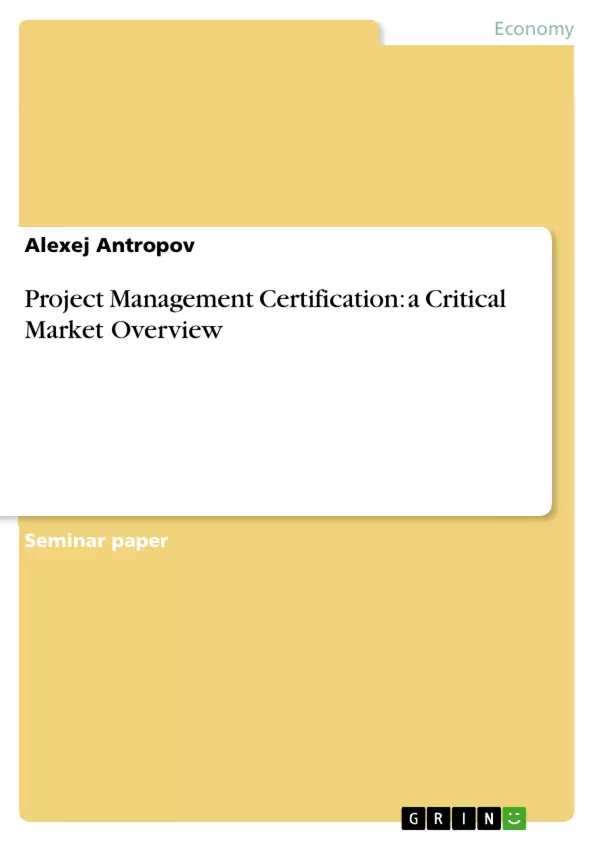More than a quarter of enterprises are organising most of their work in projects. Because of the growing acceptance of project work there is growing need for qualified staff for managing projects. But there has been much debate within the field of project management as to whether it satisfies criteria for status as a profession. Morris and Pinto reported that development and recognition of a distinct profession of project management has certainly been a strong driver in the development of standards for project management. “A body of knowledge, standards and related assessment and qualification processes can therefore be seen as essential building blocks in the formation and recognition of a profession.”
According to Kuster et al. there are two main organisations certifying project management skills: International Project Management Association (IPMA) and Project Management Institute (PMI). The scope of this term paper is to verify the truth of this statement and to provide a critical and comparative market overview about different project management certifications as well as certification methods.
Inhaltsverzeichnis (Table of Contents)
- 1. Introduction
- 2. Project Management Organisations, Knowledge Standards and Guides
- 3. Project Management Certifications
- 3.1. IPMA
- 3.1.1. About IPMA
- 3.1.2. Certification Levels
- 3.1.3. Certification Process
- 3.2. PMI
- 3.2.1. About PMI
- 3.2.2. Certification Levels
- 3.2.3. Certification Process
- 3.3. Other Global Accepted Certifications
- 3.3.1. AIPM
- 3.3.2. P2M
- 3.1. IPMA
- 4. Comparing Project Management Qualifications
- 5. Conclusions
Zielsetzung und Themenschwerpunkte (Objectives and Key Themes)
This term paper provides a critical overview of the project management certification market. It analyzes different organizations and their knowledge standards, focusing particularly on the International Project Management Association (IPMA) and the Project Management Institute (PMI).
- The paper examines the significance and evolution of project management certifications.
- It delves into the different certification levels and processes offered by leading organizations.
- The paper also investigates the role of these certifications in the professional development of project managers.
- It analyzes the strengths and limitations of various certification systems.
- The paper concludes by exploring the future of project management certifications and their impact on the industry.
Zusammenfassung der Kapitel (Chapter Summaries)
- Chapter 1: This chapter introduces the paper's topic, providing an overview of the project management landscape and the increasing importance of certification. It outlines the scope and aims of the research, focusing on the critical market overview of project management certifications.
- Chapter 2: This chapter explores the role of key organizations involved in shaping project management standards and knowledge guides, including IPMA and PMI. It examines the different frameworks, standards, and best practices developed by these organizations.
- Chapter 3: This chapter delves into the specifics of project management certifications, examining the different levels and processes offered by IPMA and PMI. It analyzes the requirements, assessment methods, and benefits associated with obtaining these certifications.
- Chapter 4: This chapter compares and contrasts the different project management qualifications offered by various organizations, highlighting their similarities and differences.
Schlüsselwörter (Keywords)
This paper focuses on the critical market overview of project management certifications, examining different organizations, knowledge standards, and certification levels. Key keywords include project management, certification, IPMA, PMI, AIPM, P2M, knowledge standards, assessment processes, and professional development.
Frequently Asked Questions
Why is project management certification becoming essential?
As more enterprises organize work into projects, there is a growing need for qualified staff. Certifications provide a standard "body of knowledge" that helps define project management as a formal profession.
What are the two main organizations for project management certification?
The International Project Management Association (IPMA) and the Project Management Institute (PMI) are the leading global organizations in this field.
How do IPMA and PMI differ in their certification levels?
IPMA typically offers a four-level certification system based on competence, while PMI focuses on different certifications like the PMP (Project Management Professional) based on experience and knowledge standards.
What are some other recognized certifications besides IPMA and PMI?
Other globally accepted certifications include AIPM (Australian Institute of Project Management) and P2M (Project & Program Management for Enterprise Innovation).
What is the benefit of obtaining a project management qualification?
It validates professional skills, ensures adherence to global standards, and enhances career development opportunities within the project-driven market.
- Quote paper
- Alexej Antropov (Author), 2011, Project Management Certification: a Critical Market Overview, Munich, GRIN Verlag, https://www.grin.com/document/179247



